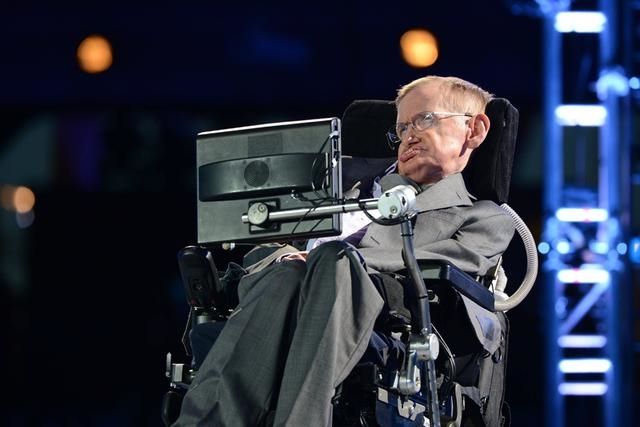Dialogue 1
Mark: How's life treating you, Jingjing?
馬克:最近這怎樣,京晶?
Jingjing: Didn't you ask me that last week? Anyway, it's going smoothly. I wish I could say the same for Stephen Hawking.
京晶:上周不是問過我了嗎?好吧,一切順利。我希望我也可以對(duì)霍金這樣說。
Mark: Oh, I know! I was so sad to hear he'd passed away. He was only 76 years old.
馬克:哦,是啊!很遺憾聽說他過世了。他才76歲。
Jingjing: I found out about it just after I saw you last week.
京晶:上周我們剛見完面我就得知此事了。
Mark: Yeah, a week ago, my social media blew up with posts about it: R.I.P. Stephen Hawking.
馬克:是的,一周前,我的社交媒體被“霍金安息”的各種發(fā)布刷屏了。
Jingjing: Have you read any of his work?
京晶:你讀過他的作品嗎?
Mark: No, and I figured now it's high time to do some. So I got his most famous book, A Brief History of Time, and am reading it on my phone.
馬克:沒有,我認(rèn)為現(xiàn)在正是最好的時(shí)候。所以我找到了他最有名的作品《時(shí)間簡史》,我正在手機(jī)上閱讀。
Jingjing: I read that a few years ago. Can you understand it?
京晶:我?guī)啄昵熬妥x過了。你能理解嗎?
Mark: Ask me in another week or so. I just started reading it on the subway coming over here.
馬克:一周左右再問我吧。我在過來這兒的地鐵上才開始讀起來。
Jingjing: When I started reading it, I thought it would be really chewy. It turned out to be both engaging and within my grasp.
京晶:我當(dāng)時(shí)開始讀的時(shí)候,我以為會(huì)比較難懂。結(jié)果發(fā)現(xiàn)引人入勝,也好理解。
Mark: That's probably why it's an international best-seller.
馬克:這也許就是為什么它熱銷全球。
Jingjing: Yeah, it's written for the general public. I'm glad I read it. Let me know what you think when you finish it.
京晶:是,這就是寫給普羅大眾看的。我還挺高興我讀過這書。你看完后告訴我。
Mark: I'm putting other books on hold for it. Hopefully I'll have something intelligent to say about it next time.
馬克:我先把其他的書放一邊緩緩,希望下次見面時(shí)我能說出點(diǎn)有智慧的東西。
Jingjing: I bet you will. Speaking of time, how about we go now and beat the lunch rush.
京晶:我打賭肯定的。說到時(shí)間,我們現(xiàn)在就走怎么樣,避開午餐高峰。
Mark: Well, if you can pull yourself away from work, I'll introduce a British pub that just opened up down the street.
馬克:如果你現(xiàn)在能從工作中抽身,我給你介紹一家這條街上剛開的英式酒吧。
Jingjing: What made you think of that?
京晶:怎么想到了這個(gè)?
Mark: I'm in the mood for British food—if you don't mind. Besides, Stephen Hawking was British.
馬克:我想在很想吃英國菜,如果你不介意,對(duì)了,霍金就是英國人。
Jingjing: Yeah, I know he comes from Oxford. I just kept forgetting because of his American voice.
京晶:是的,我知道他來自牛津。他的美國口音總是讓我忘記這一點(diǎn)。
New words:習(xí)語短語
passed away 去世
died
blew up 社交媒體中的刷屏
lots of the same kind of post on social media
high time 是時(shí)候做某事了
should be done now
chewy 咀嚼的,閱讀素材難以理解的
(here, about reading material) difficult to fully understand, with lots of information
the general public 大眾
most people, not only scientists or other experts
put...on hold 把某事暫時(shí)擱置一旁
stop doing something for a while, but don't quit
pull yourself away 忙中抽身
leave even though you are busy

Dialogue 2
Mark: Jingjing, you mentioned earlier that Stephen Hawking has an American voice. Why is that?
馬克:京晶,之前你說霍金有美國口音,這是為何?
Jingjing: Oh, that's because of the technology he used to communicate. Several companies, some of them British, were making the software and equipment. He just stuck with the first voice that was available.
京晶:是因?yàn)樗脕磉M(jìn)行交流的那種科技,有許多公司,包括一些英國的,制造了軟件和設(shè)備。他一直在用著第一次使用設(shè)備里的那種口音。
Mark: I understand he chose words and phrases by moving his hand.
馬克:我能理解他通過轉(zhuǎn)動(dòng)頭部選擇單詞與詞組。
Jingjing: That's how the first equipment worked. Later, he had to move parts of his face.
京晶:第一臺(tái)設(shè)備就是這樣運(yùn)作的。后來,他還需要移動(dòng)部分臉部。
Mark: Didn't that take forever? How could he speak at a regular rate?
馬克:那不是要花很久的時(shí)間嗎?那他怎么用正常語速說話呢?
Jingjing: He could do 15 words per minute with his hand. But with his face, it was slower. But he started to use predictive software.
京晶:他用手一分鐘可以完成15個(gè)詞,但是用臉就要慢一些。但是他已經(jīng)開始使用預(yù)測軟件了。
Mark: Is that like what we have on our smartphones?
馬克:就像是我們智能手機(jī)上使用的那樣嗎?
Jingjing: Exactly. That way, he wouldn't have to choose every letter or every word.
京晶:沒錯(cuò)完全一樣。這樣的話,他便不需要再去選擇每一個(gè)字,每一個(gè)詞。
Mark: Wow, I really don't know much about Stephen Hawking. What was the name of the disease he had?
馬克:哇哦,我對(duì)霍金真是知之甚少。他是患了什么病呢?
Jingjing: It was ALS. That stands for amyotrophic lateral sclerosis. It's a disease that causes the death of motor neurons.
京晶:ALS癥。肌萎縮側(cè)索硬化的縮寫。這種病癥會(huì)造成運(yùn)動(dòng)神經(jīng)元萎縮死亡。
Mark: Those are what make us move, right? But wait—isn't ALS the cause of the Ice Bucket Challenge?
馬克:那些(神經(jīng)元)可是讓我們的身體能夠活動(dòng)的東西啊,對(duì)嗎?但是,稍等——ALS不就是冰桶挑戰(zhàn)的起因嗎?
Jingjing: Yeah, people were raising money for ALS research.
京晶:正是。那會(huì)兒人們?yōu)闈u凍癥研究籌款。
Mark: I bet Stephen Hawking would want to be remembered for his work as a scientist, not for his disability.
馬克:我打賭霍金寧愿讓人們記住他的科學(xué)家身份和著作研究,而不是他的身體殘疾。
Jingjing: Yes, he had a strong personality, and didn't let anything stop him during his life.
京晶:是啊,他個(gè)性很頑強(qiáng),他不會(huì)允許任何事成為他生命的阻礙。
Mark: Well, I'll get going on his book.
馬克:好吧,我得繼續(xù)去讀他的書了。
Jingjing: You do that.
京晶:必須的,趕緊吧!
New words:習(xí)語短語
predictive software 預(yù)測軟件
a program that chooses words and phrases before they have been fully typed
motor neurons 運(yùn)動(dòng)神經(jīng)元
cells that respond to electricity and connect the brain with muscles in the body, for movement
get going on 某事做起來了,有進(jìn)展了
do some work on, start to make progress on











